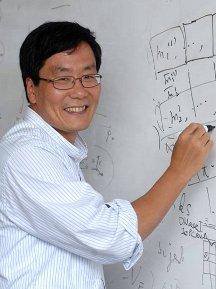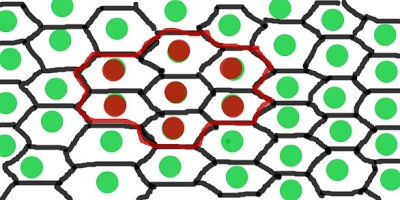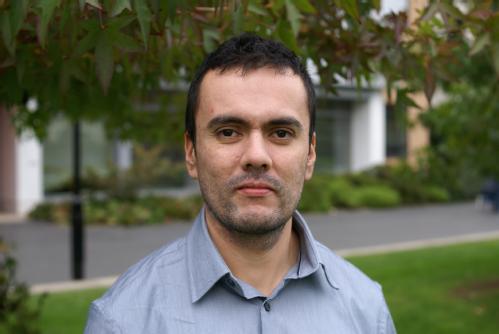Computer Science News
Warwick and King’s College London to establish London-based Centre for Urban Science and Progress
Warwick and King’s College London, in partnership with New York University, plan a major initiative in collaboration with the GLA and the London Borough of Southwark to launch 'CUSP London', a branch of NYU’s Center for Urban Science and Progress, to be based at Canada Water from 2018. The announcement was made on Monday 17 June 2014 by Boris Johnson, Mayor of London, at an event organised by Bloomberg to mark the start of London Technology Week.
London will be the first city to build upon the success of CUSP in New York, which was launched in April 2012 by Mayor Bloomberg and of which Warwick is an academic partner. In developing CUSP London, the partners will benefit from the experience in New York City, where CUSP is now established as a leader in the new field of urban science and informatics.
Professor Nigel Thrift, Vice-Chancellor of Warwick commented: "I welcome the launch of CUSP London, both as a researcher of the dynamics of cities, and as Vice-Chancellor of Warwick which is a partner both in the CUSP London initiative and the original CUSP in New York. CUSP London will be a significant engine of applied urban science research, innovation and education that will work with London as a living laboratory applying research to the needs of our capital and to other great cities."
CUSP London will bring together researchers, businesses, local authorities and government agencies to apply urban science to improving public health and wellbeing. It will draw on the real experience and ‘big data’ available in cities, thereby using the cities themselves as living laboratories to tackle their most significant issues. CUSP London will complement the MedCity initiative which the GLA recently launched with King’s and other academic partners, and the Mayor of London’s Smart London plan.
Experts at CUSP London will use data to develop deeper understanding and practical solutions to a wide range of challenges affecting people’s everyday lives. The international partnership will also train a new generation of postgraduate and PhD level urban scientists with the skills and knowledge to benefit London and other major UK and global cities.
Professor Sir Richard Trainor KBE, Principal of King’s, commented: "If we are to tackle the increasingly complex challenges facing London and other cities, we need initiatives like CUSP London. It will train a new generation of urban scientists, and harness expertise, research insights and big data from across the public and private sectors in order to enhance health and efficiency in increasingly populated and fast changing cities."
It is anticipated that CUSP London would generate around 180 construction jobs for two years, and once fully operational, to accommodate around 100 researchers and 500 students. CUSP London will seek development funding from public, industry and philanthropic sources.
Steve Koonin, Director of New York University’s Center for Urban Science and Progress, said: "We are delighted to welcome London to the CUSP family. We are honored by their strong support of our work and the steps taken to build on our successes in New York City. Our New York team stands ready to work with Kings College and the University of Warwick as the CUSP model is expanded abroad."
How to tell if a tweet is telling the truth
How to tell if a tweet is telling the truth, The Times, Pages 1-2, 19 February, 2014.
Information we find through social media cannot always be trusted. A study of social media during the Boston bombing of 2013 concluded that 29% of the most viral content were rumours. This is clearly a major problem and, given the volume – Twitter users send 500 million tweets per day – requires the use of automated techniques to solve it. Research has already identified a number of tell-tale features in the digital ‘signatures’ of social media postings and the sources that produce them that are correlated with trustworthiness. These include posting history and connections with other social media users. The Pheme project, a new £3.5M European Union funded research project involving Computer Scientists from the University of Warwick, will build on this research and will also develop ways to analyse topics in postings, their consistency with other sources and distinguish the different ways in which social media users respond to them.
By combining these different approaches, Pheme will create computer tools with improved ability to discriminate between trustworthy and untrustworthy sources and with the capacity to process the large volumes of information circulating in social media daily. These tools will be made widely available for news media, government agencies and community organisations to use. By providing the means to amplify natural self-correction mechanisms in human communication, Pheme will help people to be more confident in assessing the veracity of information they find in social media.
See: http://www.thetimes.co.uk/tto/technology/internet/article4009691.ece
Rob Procter is Professor of Social Informatics in the Department of Computer Science, University of Warwick. He led a multidisciplinary team to work with the Guardian/LSE on the ‘Reading the Riots’ project, analysing tweets sent during the August 2011 riots. This work won the Data Visualization and Storytelling – National/International category of the inaugural Data Journalism Awards sponsored by Google, the 2012 Online Media Award for the ‘Best use of Social Media’. He is a founder member of the Collaborative Online Social Media Observatory (Cosmos), a multidisciplinary group of researchers in England, Scotland and Wales that is building a platform for social media analytics.
Dr Victor Sanchez awarded Marie Curie Grant
Dr Victor Sanchez, Assistant Professor in the Department of Computer Science, has been awarded a Marie Curie Career Integration Grant from the Research Executive Agency of the EU to fund his research for the next four years. The Integration Grants assist researchers in integrating themselves in the EU with their own research budget. For the first call of 2013, more than 800 proposals from around the EU were submitted of which 22% received funding. Dr Sanchez research will focus on developing methods for storing and manipulating whole-slide images of pathology specimens, which are multi-gigapixel colour images of over 80k × 80k pixel resolutions. He will work in collaboration with the Computational Biology and Bioimaging (COMBI) group, and researchers from Universitat Autonoma de Barcelona and University of Arizona.
DCS academic wins international grant for research on cancer prognostics
A consortium of four academic and clinical institutes has won an international grant for a research project on novel multiplex prognostic biomarkers for colorectal cancer via computerised analysis of multi-protein fluorescence images. The research project led by Dr Nasir Rajpoot has been awarded the total amount of $1.05m by the Qatar Foundation. The consortium involves academic and clinical partners based in the UK and Qatar. The research team at Warwick will be composed of two new researchers and key investigators from four departments across the campus in Dr Nasir Rajpoot (Computer Science), Dr Mike Khan (Life Sciences), Prof David Epstein (Mathematics), and Dr Rich Savage (Systems Biology).
Prof Jianfeng Feng receives Royal Society Wolfson Research Merit Award

Professor Jianfeng Feng from the Department of Computer Science, has been awarded a Royal Society Wolfson Research Merit Award.
The Wolfson Research Merit Award is one of the most prestigious UK awards, supported by the Royal Society, the UK's national academy of science. The scheme provides up to 5 years’ funding after which the award holder continues with a permanent post at the host university. Jointly funded by the Wolfson Foundation and the Department for Business, Innovation and Skills (BIS), the scheme aims to provide universities with additional support to enable them to attract to this country or to retain respected scientists of outstanding achievement and potential.
The Wolfson Foundation is a grant-making charity established in 1955. Funding is given to support excellence and the focus of the award is a salary enhancement. More information is available from http://www.wolfson.org.uk.
Professor Feng will be working on a project entitled "Bridging the gap between fMRI and Genome-wide data with applications in diseases".
News on some of Professor Feng's more recent work can be found at: http://edition.cnn.com/2011/10/04/health/depressed-brains-hate-differently/?hpt=he_c2
(See also The Royal Society announcement.)
Dr Amin Coja-Oghlan receives ERC Starting Grant

Dr Amin Coja-Oghlan, Associate Professor (Reader) in the Department of Computer Science and Warwick Mathematics Instititue, has been awarded the ERC Starting Grant.
ERC Starting Grant is one of the most prestigious grants awarded by the European Research Council for world-class researchers, and Amin is one of the very few researchers in Warwick to receive this grant. His new ERC Starting Grant, worth over a million of euros for the period of five years, has been awarded for his project »Phase Transitions and Computational Complexity«.
Dr Coja-Oghlan's main research area is in the Theoretical Computer Science, with special focus on the study of Algorithms and Complexity via rigorous mathematical methods, on the boundary of computing, combinatorics, and probability. He published pver 30 papers in refereed journals (eight as a sole author) and a similar number of papers in the proceedings of international Computer Science conferences. He is the winner or the EATCS Award for the best paper in Track A at the 36th International Colloquium on Automata, Languages and Programming (ICALP 2009), and he has been an invited speaker at numerous international conferences in computer science and in mathematics.
Synthetic biology meets Computer Science

Dr Sara Kalvala has been awarded a grant towards developing tools for Synthetic Biology. The multidisciplinary project, funded by EPSRC and involving colleagues from Nottingham and Sheffield, aims at developing programmable defensive bacterial coatings and skins.
Scientific and technical advances mean that it is practically feasible to insert external genes into bacteria; the difficulty is in making sure the modified bacteria do something useful. For this, it is useful to approach the cell as a machine and its genetic engine as made up of brick-like components that can be combined in different ways. This is the idea behind the new and exciting discipline of Synthetic Biology.
Sara's experience in compilers and formal logics will inform the development of tools which will help assemble genetic networks and model their interactions with host genes. Then, the whole procedure to perform this genetic engineering in an efficient and robust way will be addressed. Then we will be ready to actually manipulate the bacteria and create useful bacterial coatings and skins.
The project is due to start in early 2012, and research staff will be recruited at all three sites. At Warwick we will be looking for a post-doctoral researcher with expertise in both computer science and biology. For further information please contact Sara Kalvala.

